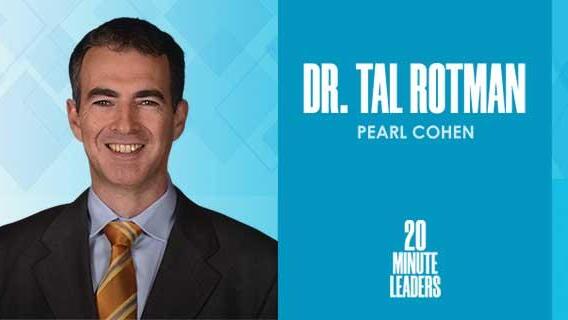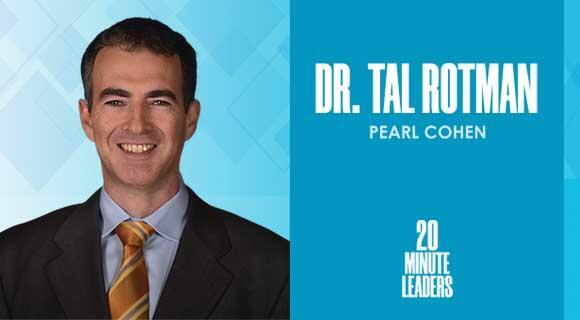
20-Minute Leaders
“Most people don't go to mediation. I think that's a market failure.”
Mediation is an underutilized option for settling disputes, says Tal Rotman, partner and chair of alternative dispute resolution at Pearl Cohen.
Mediation is an underutilized option for settling disputes, says Tal Rotman, partner and chair of alternative dispute resolution at Pearl Cohen. He shares that the lack of awareness about mediation is a market failure. Rotman explains that in court or arbitration, a third party decides who is right, but mediation is different. A mediator has no decision making power, but they listen to both parties in the conflict, separately and confidentially so the whole story comes out. He says this is especially helpful when the real issues aren’t legal issues but business or emotional arguments. Then their job is to find some middle ground and a solution that will be agreed upon by both sides. Mediation brings together Rotman’s experience in law, psychology, and accounting and allows him to help people and companies. He shares that his solution for boredom in his life is finding a new path to explore.
Click Here For More 20MinuteLeaders
You have experience in mediating and litigating stakeholders’ disputes in startup companies. You were also with McKinsey &Company, lectured at Tel Aviv University, and clerked for the Israeli Supreme Court, with a PhD in law, master’s in psychology. What do you enjoy?
At this point, everything comes together with this business mediation thing. I've been litigating cases in Israeli courts for many years now, and it's a very inefficient way to solve problems between business associates. This is not what I would recommend to a family member who finds themselves in a dispute.
High-tech companies start very often on a very friendly basis with inexperienced people. Then at some point, if they are lucky, boom. Everything changes and it changes very, very fast. There is so much friction. Some arguments lead to disputes. What I think is very sad is to see people that founded the company together that were good friends and now there is some sort of a stupid dispute that ends up in litigation because then the company could go down the drain as well. This is not a matter of just helping the people; it's also helping their companies.
It brings together what I've done in the past, which is in the world of law, accounting, psychology, litigation. The whole idea of mediation is that instead of going to a judge or arbitrator, which is essentially a judge that you hired, who decides who is right—the mediator is a totally different philosophy. It's someone that is experienced and hears both parties. He has absolutely no power to decide on anything. It's basically your experience, what you have seen, what you have gathered throughout life. The outcome could be remarkable because instead of people ruining their relationship spending months and years in court, spending really large amounts of money on lawyers and legal fees, and ruining the company. When you manage to do this trick where they are all happy, then it's like magic. They are so relieved and thankful, so it's really rewarding.
I haven't met many people that are as excited and passionate about this idea of mediation as you. How did this start for you?
It started gradually. I’ve seen courts and sometimes you win, sometimes you lose. It's just a problematic process. People are always so disappointed coming out of it. Even if they won the case, they just want to get rid of it at the end of the day.
The great thing about mediation is that you have tools that the judge does not have. At the end of the day, it's more about economics and cognitive psychology than anything else. Because imagine, two people are coming in front of the judge and each one would tell just part of the story, maybe the truth but not the whole truth. As a mediator, you can meet people separately. They tell you what the real story is. Then you hear the real story from the other side. Then sometimes, you see many new avenues, potential solutions that they don't see.
How much of it comes down to misunderstandings, miscommunication, between people who are not necessarily being totally open and transparent in a situation?
This is where cognitive psychology enters. This is where you have cognitive biases. People have a self-serving bias. Even if they agree on the facts, they would still think that things are leaning to their favor.
You think you are right, and maybe you are right from your perspective, but your friend or your ex-friend is right from his side. Sometimes as an observer, you can say, "I can see why both of you are feeling this way. Maybe there is a solution that would make sense." If it makes sense, both parties agree, and you have a resolution. This conflict has ended in a few hours instead of a few months or years. And there’s a huge savings of money here. But you come with a solution which is sometimes a business solution.
Remember, if you go to court or through arbitration, you have to stick to legal arguments. Lawyers take reality, they translate it into legal words, and then the court decides on the legal stuff. But this is not the real argument. The real argument is a business argument sometimes. Sometimes it's an emotional argument. In court, you have to frame everything in terms of legal rights. This kind of distorts everything. You lose control over it because you handed the control to the lawyers. If you talk about the real issues with someone who is attentive and has the incentive to help you—because otherwise, it's a failure for me as well—then sometimes the magic happens.
Is there ever an advantage to going to legal proceedings in court rather than a mediator? It almost seems to be trivial that a mediator is always the better option.
Most people don't go to mediation. I think that's a market failure. People think, "I've actually tried to settle with this guy. I've tried to be reasonable with him. He wouldn't listen." So they think, "A third person who knows nothing about the dispute, who knows nothing about us, how could he be helpful?" The answer for that is because I get information that you don't share with each other and because I cannot decide, so I can only offer something that would be a win-win, otherwise nothing happens.
There’s a potential downside one has to admit: mediation could fail. You could come to a mediator, you would spend time—not as much time as you would spend in court—you would spend money—not as much money as you would spend in court—but at the end of the day, there wouldn't be a decision because this is not how this thing works. It's not about deciding who's right and who's wrong; it's about trying to understand the interest of all parties involved and trying to find some middle ground. If there is absolutely no middle ground, maybe there is no reason to mediate, but it's very few of the cases where there is nothing to talk about.
How do we optimize a market that will allow for mediators or mediation to be a leading idea for people that are in disputes?
A lot of it, I think, is education. People don't know and they are not familiar with mediation. They don't understand the logic behind it.
Now I'm representing a company that had a valuation of $40 million and then was run into the ground. It's just a loss of all the promise, and now they are fighting over a corpse. It's just a tragedy. The only reason is because they failed to settle.
I just love your fun fact about the tenor saxophone and jazz. Tell me a little bit about following your own curiosity and passion.
I keep listening to myself. When I am bored, and I get bored fairly quickly, I think about what I'm going to do to change that. There are so many interesting things happening in the world, so always, there is a new path you can take. I had my first music lesson three years ago. And now, like in two hours’ time, I have a bunch of old folks and we'll be playing together so it's really, really nice. That's a huge world that was opened just a few years ago.
For years, I thought, "Well, I'm too old to start." But at the end of the day, it's really more about believing in yourself and rising to the challenge. Our brain is a very sophisticated machine. And it still works even at my age.
Michael Matias, Forbes 30 Under 30, is a Venture Fellow at Innovation Endeavors as well as investment Venture Partner at Secret Chord and J-Ventures. He studies Artificial Intelligence and Human-Computer Interaction at Stanford University, and was an engineer at Hippo Insurance. Matias previously served as an officer in the 8200 unit. 20MinuteLeaders is a tech entrepreneurship interview series featuring one-on-one interviews with fascinating founders, innovators and thought leaders sharing their journeys and experiences.
Contributing editors: Michael Matias, Megan Ryan

